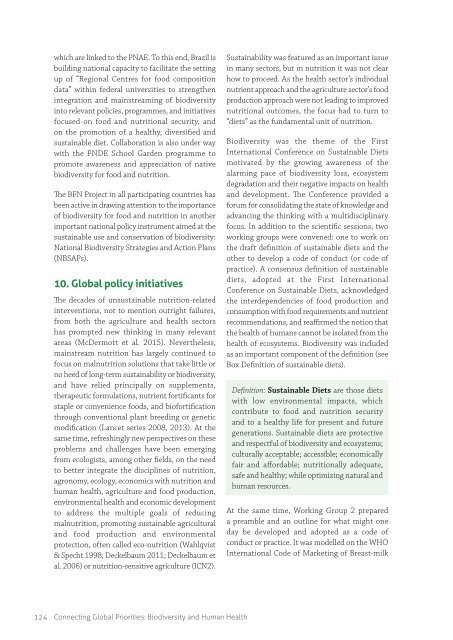Connecting Global Priorities Biodiversity and Human Health
1ZcgwtN
1ZcgwtN
Create successful ePaper yourself
Turn your PDF publications into a flip-book with our unique Google optimized e-Paper software.
which are linked to the PNAE. To this end, Brazil is<br />
building national capacity to facilitate the setting<br />
up of “Regional Centres for food composition<br />
data” within federal universities to strengthen<br />
integration <strong>and</strong> mainstreaming of biodiversity<br />
into relevant policies, programmes, <strong>and</strong> initiatives<br />
focused on food <strong>and</strong> nutritional security, <strong>and</strong><br />
on the promotion of a healthy, diversified <strong>and</strong><br />
sustainable diet. Collaboration is also under way<br />
with the FNDE School Garden programme to<br />
promote awareness <strong>and</strong> appreciation of native<br />
biodiversity for food <strong>and</strong> nutrition.<br />
The BFN Project in all participating countries has<br />
been active in drawing attention to the importance<br />
of biodiversity for food <strong>and</strong> nutrition in another<br />
important national policy instrument aimed at the<br />
sustainable use <strong>and</strong> conservation of biodiversity:<br />
National <strong>Biodiversity</strong> Strategies <strong>and</strong> Action Plans<br />
(NBSAPs).<br />
10. <strong>Global</strong> policy initiatives<br />
The decades of unsustainable nutrition-related<br />
interventions, not to mention outright failures,<br />
from both the agriculture <strong>and</strong> health sectors<br />
has prompted new thinking in many relevant<br />
areas (McDermott et al. 2015). Nevertheless,<br />
mainstream nutrition has largely continued to<br />
focus on malnutrition solutions that take little or<br />
no heed of long-term sustainability or biodiversity,<br />
<strong>and</strong> have relied principally on supplements,<br />
therapeutic formulations, nutrient fortificants for<br />
staple or convenience foods, <strong>and</strong> biofortification<br />
through conventional plant breeding or genetic<br />
modification (Lancet series 2008, 2013). At the<br />
same time, refreshingly new perspectives on these<br />
problems <strong>and</strong> challenges have been emerging<br />
from ecologists, among other fields, on the need<br />
to better integrate the disciplines of nutrition,<br />
agronomy, ecology, economics with nutrition <strong>and</strong><br />
human health, agriculture <strong>and</strong> food production,<br />
environmental health <strong>and</strong> economic development<br />
to address the multiple goals of reducing<br />
malnutrition, promoting sustainable agricultural<br />
<strong>and</strong> food production <strong>and</strong> environmental<br />
protection, often called eco-nutrition (Wahlqvist<br />
& Specht 1998; Deckelbaum 2011; Deckelbaum et<br />
al. 2006) or nutrition-sensitive agriculture (ICN2).<br />
Sustainability was featured as an important issue<br />
in many sectors, but in nutrition it was not clear<br />
how to proceed. As the health sector’s individual<br />
nutrient approach <strong>and</strong> the agriculture sector’s food<br />
production approach were not leading to improved<br />
nutritional outcomes, the focus had to turn to<br />
“diets” as the fundamental unit of nutrition.<br />
<strong>Biodiversity</strong> was the theme of the First<br />
International Conference on Sustainable Diets<br />
motivated by the growing awareness of the<br />
alarming pace of biodiversity loss, ecosystem<br />
degradation <strong>and</strong> their negative impacts on health<br />
<strong>and</strong> development. The Conference provided a<br />
forum for consolidating the state of knowledge <strong>and</strong><br />
advancing the thinking with a multidisciplinary<br />
focus. In addition to the scientific sessions, two<br />
working groups were convened: one to work on<br />
the draft definition of sustainable diets <strong>and</strong> the<br />
other to develop a code of conduct (or code of<br />
practice). A consensus definition of sustainable<br />
diets, adopted at the First International<br />
Conference on Sustainable Diets, acknowledged<br />
the interdependencies of food production <strong>and</strong><br />
consumption with food requirements <strong>and</strong> nutrient<br />
recommendations, <strong>and</strong> reaffirmed the notion that<br />
the health of humans cannot be isolated from the<br />
health of ecosystems. <strong>Biodiversity</strong> was included<br />
as an important component of the definition (see<br />
Box Definition of sustainable diets).<br />
Definition: Sustainable Diets are those diets<br />
with low environmental impacts, which<br />
contribute to food <strong>and</strong> nutrition security<br />
<strong>and</strong> to a healthy life for present <strong>and</strong> future<br />
generations. Sustainable diets are protective<br />
<strong>and</strong> respectful of biodiversity <strong>and</strong> ecosystems;<br />
culturally acceptable; accessible; economically<br />
fair <strong>and</strong> affordable; nutritionally adequate,<br />
safe <strong>and</strong> healthy; while optimizing natural <strong>and</strong><br />
human resources.<br />
At the same time, Working Group 2 prepared<br />
a preamble <strong>and</strong> an outline for what might one<br />
day be developed <strong>and</strong> adopted as a code of<br />
conduct or practice. It was modelled on the WHO<br />
International Code of Marketing of Breast-milk<br />
124 <strong>Connecting</strong> <strong>Global</strong> <strong>Priorities</strong>: <strong>Biodiversity</strong> <strong>and</strong> <strong>Human</strong> <strong>Health</strong>


